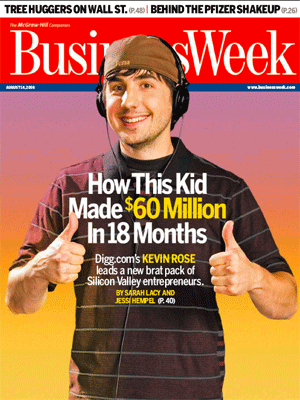I had been noticing the number of communications industry bloggers talking about how blogs are getting to be more important. Blogs are getting to be taken seriously, duhhh. Bloggers writing about blogging.
I won’t link to any of the egregious examples, in order to protect the guilty, some of whom owe me lunches, coffees or whatever.
As David Olive of The Star wrote on Sunday:
Bloggers, mostly one-person operations with no reporting staff, scalp much of their content from the mainstream publications and network broadcasts they mock for their slow-footedness. Bloggers have not set the agenda in politics, science or any other realm.
“The blogosphere is not a hothouse where brilliant new ideas are generated by the self-described iconoclasts who populate it,” says Rick Salutin, media critic at The Globe and Mail. “The main qualification for blogging is that you failed to get a mainstream media job. Writers on the Web tend to be in touch only with other bloggers, not people in the street.
Mark Evans said ‘Ouch!’ to that comment – but he is both a blogger and a journalist.
It could be worse. You could be Adnan Hajj, a photographer for Reuters (a mainstream media outlet) who was caught ‘enhancing‘ a photo for propaganda effect. In that instance, it was bloggers who caught what Reuters termed photo editing software, improperly used on this image.
Hmmm.  Olive’s article is a little too strong, but it is effective in opening some discussion points.
Olive’s article is a little too strong, but it is effective in opening some discussion points.
Self-congratulatory blog content sounds too similar to the way Torontonians used to say (or still say) that their hometown was a world-class city. Let’s face it. Real world-class cities don’t have tell people that they are world-class. They just are.
Blogging about the importance of blogging is self-indulgent. A form of infinite regression. (Of course, that leads to the question of where does this blog entry fit?)
It is a very different matter to recognize the phenomenon of diverse sources of content creation and attempt to identify business opportunities that arise from such a transformation.
It was likely in this vein that Business Week features Digg on its cover, although the shabby quality of the report itself has been widely discussed (see Mark Evans, Rob Hyndman and Om Malik, among others). Again, we see that ‘mainstream media’ can sometimes fail to apply the level of editorial standards that would enable traditional outlets to leverage their brands in the Web 2.0 environment.
 Can anyone seriously question that there are fundamental shifts underway in societal interaction and information distribution? I think Nike has it right. Just do it.
Can anyone seriously question that there are fundamental shifts underway in societal interaction and information distribution? I think Nike has it right. Just do it.
Keep blogging. We’ll figure out the rest as it happens.
Update:
In an attempt to demonstrate its adherence to a higher standard, Reuters has now pulled the entire body of work by Adnan Hajj.
Technorati Tags:
Adnan Hajj, Reuters, Om Malik, Rob Hyndman, Mark Evans, Business Week, David Olive, Toronto Star
